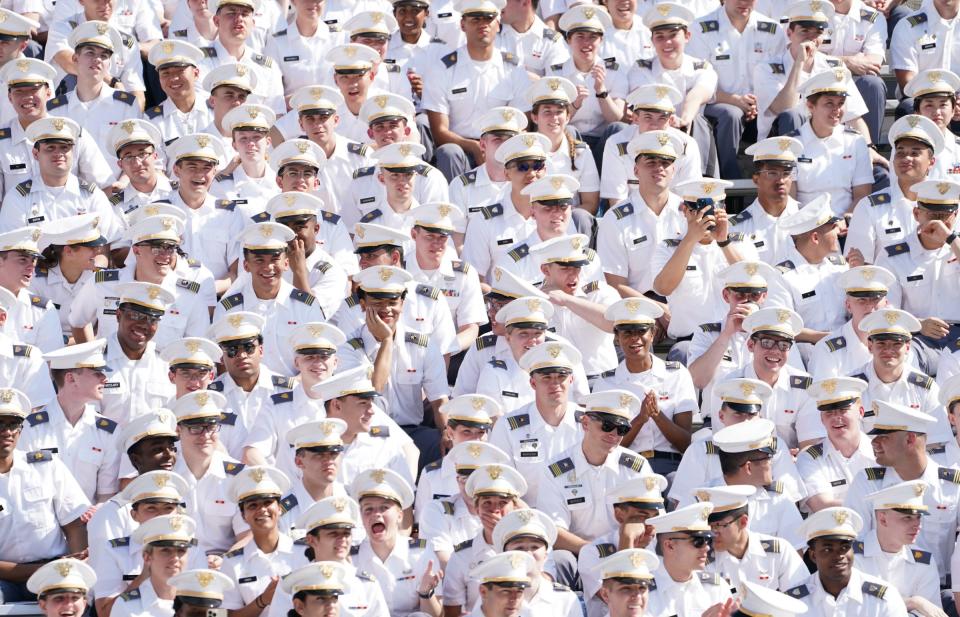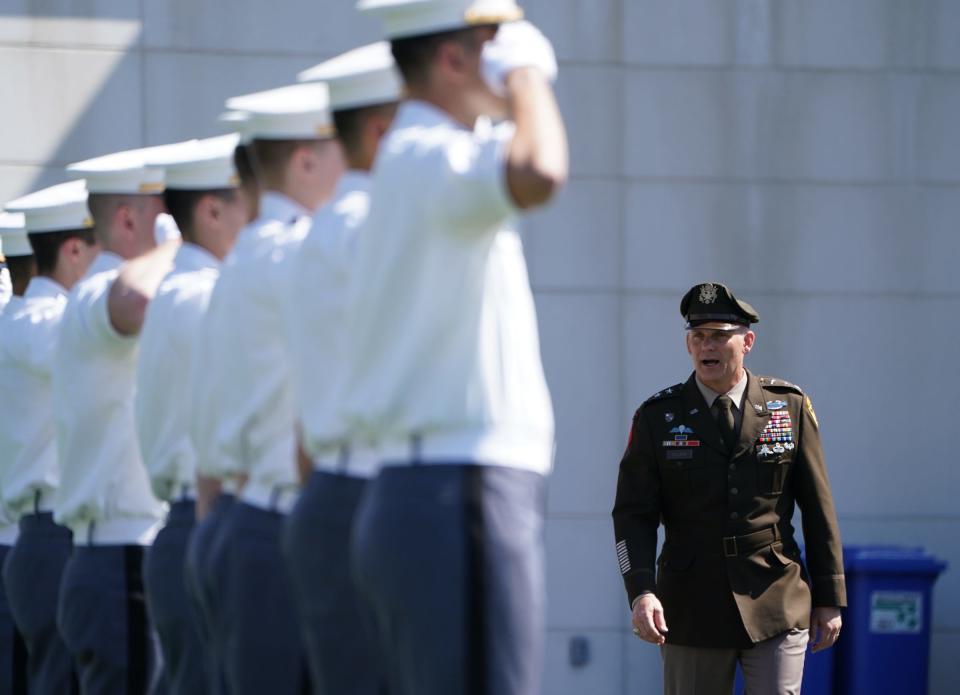Supreme Court affirmative action ruling exempts military academies. But for how long?
The organization that led the crusade against affirmative action at Harvard and the University of North Carolina is eyeing a new target: military academies.
When the Supreme Court issued its majority opinion on the cases late last month, determining the consideration of race in college admissions violates the Fourteenth Amendment’s equal protection clause, the justices said the opinion doesn’t apply to military academies. Echoing previous decisions, the conservative members of the court concluded these schools have “potentially distinct interests” when it comes to promoting racial diversity on campus.
Now, Students for Fair Admissions, which sued to end race conscious admissions at Harvard and UNC, “is exploring the legality of using race at these institutions – West Point, Annapolis and the Air Force Academy,” legal strategist and SFFA President Edward Blum wrote in a recent email to the group’s members and obtained by USA TODAY. These are the most selective of the country’s five federal service academies.
“If you know of any student who was recently rejected from these institutions, or any students who will be applying to any of them,” Blum's email continued, “please contact me.”
If the effort is successful, it could have far reaching implications.
Higher ranks out of reach for Latinos, though they are the fastest growing population in the US
What exactly did the Supreme Court say about military academies?
The Supreme Court has long deferred to the executive branch on matters of national security, and it has in past affirmative action decisions explicitly agreed with the argument that a diverse officer corps is critical for the military to carry out its missions.
In its landmark 2003 opinion on affirmative action, Justice Sandra Day O’Connor wrote for the majority about the importance of a racially diverse officer corps and noted that the “primary sources” for those ranks were the service academies and ROTC programs.
Back then, a majority of the court drew a direct line from the academies to other colleges. Quoting from a brief in that case filed by military officers, O’Connor wrote that “we agree that ‘it requires only a small step from this analysis to conclude that our country’s other most selective institutions must remain both diverse and selective.’”
But in the latest decision involving Harvard and UNC, a majority of the court didn’t explicitly say what it thinks about the service academics – only that their circumstances were not at issue. And even if a majority ultimately believes there is still a government need for a diverse military, it delinked that interest from non-military schools.
For Blum, this makes these academies a natural next target for litigation.
“SFFA and our allied partners believe that the United States service academies are subject to our nation’s civil rights laws and Constitution,” he told USA TODAY in an email. “It must follow, therefore, that an applicant’s race must not be used in admissions decisions.”
What are the five federal service academies?
The United States Military Academy (USMA) in West Point, New York;
The United States Naval Academy (USNA) in Annapolis, Maryland;
The United States Air Force Academy (USAFA) in Colorado Springs, Colorado;
The United States Coast Guard Academy (USCGA) in New London, Connecticut; and
The United States Merchant Marine Academy (USMMA) in Kings Point, New York.
These schools are among the country’s most elite and selective higher education institutions.
A large majority of their applicants, who typically need to be nominated by a member of Congress, are rejected. Fewer than 11% of West Point’s applicants in 2021, for example, were admitted.

The role of affirmative action at federal service academies
In part because of how competitive these schools are, they sometimes consider an applicant’s race as one factor that determines their admission. Then there’s the notion, as established in court precedent, that a racially diverse officer corps – and thus a racially diverse pipeline into that corps – is critical for national security.
The officer corps has long been lacking in diversity. While close to 1 in 10 active-duty officers are African American, for instance, they account for a much smaller percentage of generals. Such imbalances are especially evident at the three- and four-star levels, ranks where the most consequential decision-making occurs.
The racial makeup at service academies tends to reflect the breakdowns seen in the military’s highest echelons. Just 6% of the undergraduates at the Naval and Air Force academies, for example, are Black. While the institutions – particularly West Point – have had some demographic shifts in the past decade or so, for the most part white undergraduate enrollment has hovered around two-thirds.
Advocates say the trends underscore the ongoing need for affirmative action at these academies.
"Prohibiting educational institutions from using modest, race-conscious admissions policies would impair the military’s ability to maintain diverse leadership, and thereby seriously undermine its institutional legitimacy and operational effectiveness," several military leaders wrote in their brief supporting Harvard and UNC last year.
The Pentagon told USA TODAY in a statement that it is evaluating the Supreme Court's decision "and its potential impacts on our practices."
Where are the Black officers? US Army shows diversity in its ranks but few promotions to the top
Republicans in Congress target DEI, affirmative action in military
Many GOP lawmakers have made it their mission to rid the military of of diversity, equity and inclusion programs – and with the court’s recent decision, some are zooming in on affirmative action’s military carve-out.
In June, amid negotiations over federal defense spending and policy, Sen. Roger Wicker (R-Miss.) unveiled legislation that would prohibit race-based affirmative action in the military.
Then, the day the court’s decision came out, Wicker, the ranking member on the Senate’s Armed Services Committee, tweeted that he would update the proposal to “further prohibit” race-based affirmative action in the academies specifically.
Progressives: Diversity matters only ‘when deciding who can fight and die for our country'
The conservative justices' carve-out for military academies infuriated many progressive lawmakers.
“The court is saying diversity shouldn’t matter, EXCEPT when deciding who can fight and die for our country – reinforcing the notion that these communities can sacrifice for America but not be full participants in every other way,” wrote Rep. Jason Crow (D-Colo.), a former Army Ranger, on Twitter.
It was a sentiment shared by many on the left – that the court’s exemption of military academies was at best arbitrary and at worst, as Crow put it, “outright grotesque.”

Carlos Vera, the executive director of advocacy organization Pay Our Interns and a former servicemember, said it’s “incredibly telling” that the court exempted military academies. “The message is clear,” he said in a statement. “The highest court in the nation has said it’s fine to send more Black people to war, but we don’t need more Black people at elite institutions.”
Where are the Black officers? US Army shows diversity in its ranks but few promotions to the top
The service academies tend to feed into the military’s highest ranks. Either way, many advocates and experts – including military leaders – go back to that direct line then-Justice O’Connor drew between the academies and other colleges.
“If you buy the argument that diversity matters for the military – which I do and a majority of Americans do – then why would that not also be true for other institutions?” said James Murphy, the deputy director of higher ed policy at ERN, an advocacy and research organization.
In her dissent, Justice Sonia Sotomayor made the same point, concluding: “The Court’s carveout only highlights the arbitrariness of its decision and further proves that the Fourteenth Amendment does not categorically prohibit the use of race in college admissions.”
CONTRIBUTING: Tom Vanden Brook, USA TODAY
Contact Alia Wong at (202) 507-2256 or awong@usatoday.com. Follow her on Twitter at @aliaemily.
This article originally appeared on USA TODAY: Affirmative action at military academies protected in Supreme Court ruling

